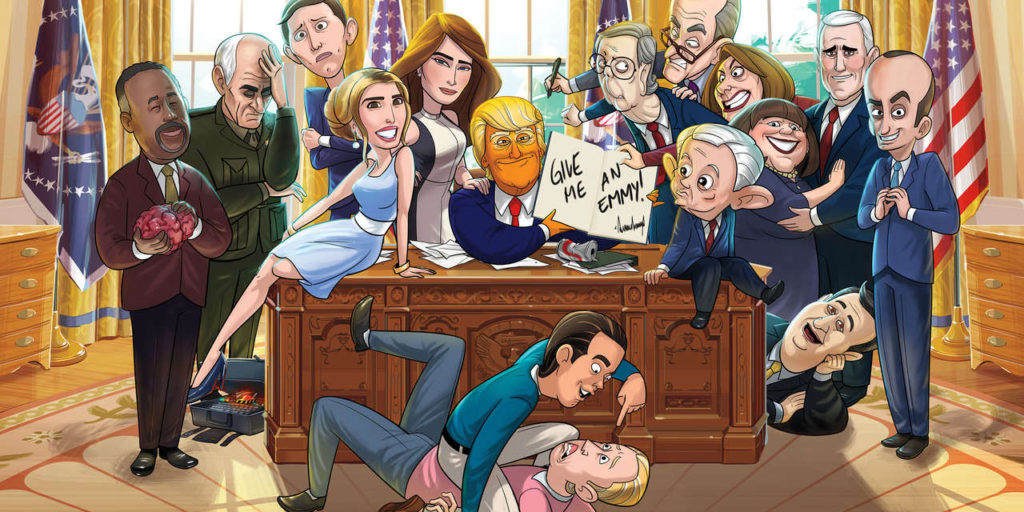How do you satirize what is already a joke? How do you peel beneath the surface to reveal the underlying absurdity within when the surface no longer exists? Does pointing out these absurdities encourage meaningful activism and change, or does it lull people into a false sense of complacency and hopelessness? How do you create a caricature of a consequential figure without minimizing their real world harms?
These are all tough questions with no straightforward answers, but that isn’t stopping anyone from trying.
Showtime’s “Our Cartoon President” is the newest entry into the already bloated Trump-satire micro-industry. The show follows a cartoon rendering of Donald Trump around the White House as he attempts to perform a job he almost certainly has no interest in doing. The show attempts to make colorful characters out of everyone in the president’s orbit; Trump’s immediate family, speechwriter Stephen Miller, Vice President Mike Pence, White House Chief of Staff John Kelly and pretty much anyone else even tangentially related to the spectacle of modern politics has their own animated doppelgänger.
The results have been underwhelming, to say the least.
The show has been almost universally rejected by the media and the public alike, with just a 30 percent critic score and a 39 percent viewer rating on the popular review aggregator website Rotten Tomatoes. But the crushing un-funniness of the cartoon is only secondary to its other shortcomings.
The show seems to want to point out what it sees as important and unexamined truths about the real estate mogul-turned reality star-turned president. It wants you to know that Trump is an infantile slacker who shows open disdain for even the most basic processes of governing; this, of course, has already been exhaustively reported. It also wants you to notice how the president continually places bets on the nation’s worst and most bigoted instincts in order to periodically shore up his base, even though we’ve all witnessed this play out live on national television multiple times. Half of the jokes in the show are just references to things Trump has already said or done, and the cartoonish stunts he pulls in the show only seem a half a step up from what presently constitutes reality.
In the worst moments of “Our Cartoon President,” the show — presumably unintentionally — makes Trump out to be a prototypical lovable goofball patriarch, in the mold of Homer Simpson. It would be hard to imagine this being the goal of the series, and the fact that Trump is a real person, whose policies have resulted in concrete material horrors for multitudes of marginalized people, hardly makes this a welcome byproduct for someone watching.
The show also portrays Generals John Kelly and H.R McMaster as sympathetic operatives who are desperately trying to bring a semblance of competence into the chaotic West Wing. However, both Kelly and McMaster have been accused of serious crimes and harmful views in their own right, with McMaster being accused of aiding and abetting human rights abuses while serving as a military commander during the Iraq War. General John Kelly also has a long and exhaustive record of defending torture, and has been accused of facilitating it while in charge of the Guantanamo Bay Prison.
Is this really the goal? To make the representatives of the ugliest features of empire into belabored, likeable underdogs who have to answer to an imbecile? Sure, the fact that a pair of ruthless and scheming men — who’ve spent their whole career dealing with other ruthless and scheming men — found themselves answering to a lazy pampered egomaniac is quite humorous, but this all could’ve been shown without making them out to be relatively agreeable professionals. McMaster has since been fired by Trump
“Our Cartoon President” is a tremendous failure, but it’s only a small part of the problem.
America has political satire fatigue. As James Poniewozik of The New York Times reported in his review of “Our Cartoon President,” multiple parodies of the president have found homes on television.
“Who, at this point, does not have a Donald Trump? ‘Saturday Night Live’ does, and Comedy Central does, and talk shows do, and Johnny Depp does. There are more Trump-branded spoofs, parodies and sendups than there are Trump-branded hotels,” Poniewozik remarks.
Herein lies the problem: Donald Trump is not an understated, mysterious figure ready to be picked apart and deconstructed. He’s an ever-imposing monstrosity who occupies a permanent presence in our lives; all his fuckups, transgressions and predatory admissions have a permanent home in an increasingly unavoidable media cycle that now lives in our pockets.
In the past, political satire has operated on a sort of illuminating smugness. Take Jon Stewart, former host of The Daily Show, for example: He meticulously deconstructed the political sphere during the Bush era, peeling back layer after layer in order to expose the idiocy of current events. While funny, the message of the show always boiled down to the same essence: Look at how dumb these people are, and look at how smart I am.
This method no longer works in an age where the idiocy is self-evident. No further analyzation is needed, and satire — no matter how clever — ends up having nothing new or interesting to say; it’s redundant when juxtaposed with the news. When reality is a tragedy and comedy all at once, it’s hard to even see the utility of satire for satire’s sake.
Armando Iannucci, who is the creator of “The Thick of It”, its American reboot “VEEP” and the director of “The Death of Stalin” is perhaps the best living satirist. He also shares these concerns about the state of political comedy. In recent op-ed for The Washington Post, Ianucci described how reality has become stranger than fiction:
“No showrunner in his or her right mind would make their sitcom president urge his press secretary to go out on Day 1 of his administration and change the laws of math. If a hapless Sean Spicer character on a TV comedy had to spin photos showing a half-empty Mall into proof of the biggest inauguration crowd ever assembled, ever, period, President Trump would tweet that it was ‘unwatchable.’”
Aside from problems of comedy, there is also the role — or lack thereof — that satire plays in real world changes. For example, did The Daily Show do anything? Did it stop the war in Iraq that it was so ardently against? Or slow down the rise of the right-wing Tea Party political movement, something it skewered over and over again? As of today, America doesn’t have any less of an outsized military presence around the world, and the Tea Party movement has had incredible electoral success and fundamentally changed politics.
Satire is important. It has the ability to inform and has historically had a role in fighting against censorship. But political satire untethered from any meaningful concurrent call for action has the ability to be both ineffective and detrimental. As journalist Padmini Parthasarathy notes in Firstpost, this can be incredibly damaging:
“Too much satire, too much culture, too much self-care, can lull us into a false sense of security. Look, the world is still spinning! We have nothing to worry about, we think. But there are too many lives at stake to disengage from the political world like this.”
And he’s right. Political satire doesn’t have to cure all the world’s ills, or stop every five seconds to give a rousing call to arms like Vladimir Lenin at Finland Station circa 1917; but the moment the consumption of media and satire becomes a substitute for civic engagement in life is the moment we cross a dangerous threshold.
“Our Cartoon President,” or any other Trump-centric comedy, isn’t the cause of this problem, but rather exists on a continuum with much of the progression of liberal political comedy in recent years. After all, it’s hard to know how to strike the right balance. At its best, satire can be thoughtful, informative and genuinely hilarious. The problem comes in when it sees itself as something else, or when it utterly fails at its proper goals in the first place.
As we wade into increasingly bizarre and dangerous waters, many long-standing cultural institutions will be forced to rethink their overlying goals and practices. Satire is merely one of them, and whatever conclusions and new forms it comes to will undoubtedly be insignificant in the broader context of political and social change.




Comments are closed.